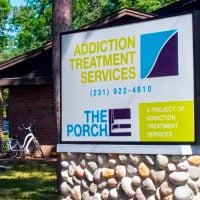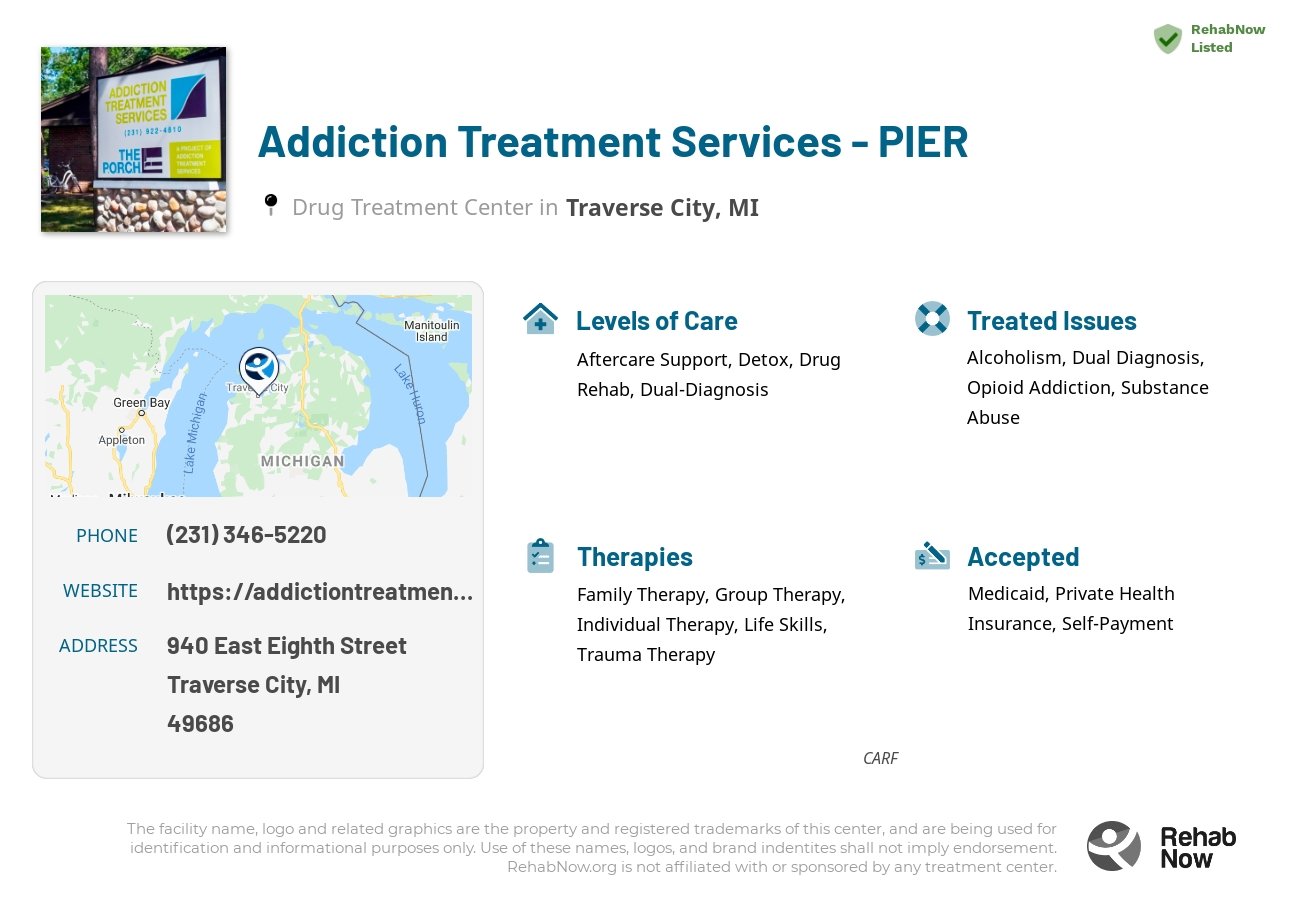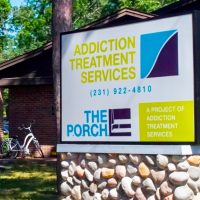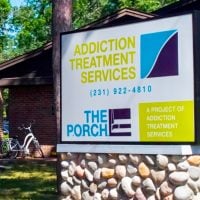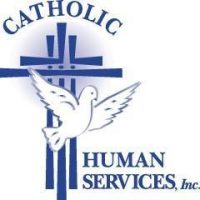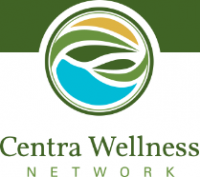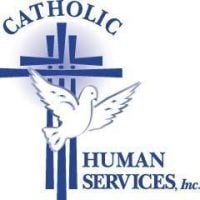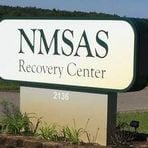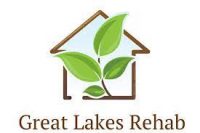Addiction Treatment Services - PIER
Drug Rehab Center in Traverse City, Michigan
Addiction Treatment Services - PIER is a 15 bed facility offering comprehensive addiction treatment, detox services, multidisciplinary care and aftercare support for individuals suffering from alcoholism, substance abuse and other mental health issues.
About Addiction Treatment Services - PIER in Michigan
Addiction Treatment Services – PIER, positioned in the serene locale of Traverse City, Michigan, caters to adults grappling with substance use disorders. Esteemed for its comprehensive approach, the center integrates mental health assessments, counseling, detox, residential treatment, and outpatient programs, including transitional housing solutions. With 15 beds, it embodies a nexus of recovery and respite for those committed to surmounting addiction.
Boasting CARF accreditation, Addiction Treatment Services – PIER reinforces its commitment to exemplary care standards. This facility not only addresses the immediate challenges of addiction but extends its support through aftercare, leveraging evidence-based practices to foster durable recovery pathways.
- Comprehensive Mental Health Support: Incorporates mental health assessment and counseling into the treatment plan, ensuring individualized care.
- Diverse Treatment Modalities: Offers a blend of inpatient detox, residential treatment, and outpatient programs to meet varied recovery needs.
- Structured Sober Living Environment: Provides a supportive and structured living situation that reinforces recovery principles and encourages personal responsibility.
Addressing a spectrum of issues from alcohol and drug addiction to dual diagnosis and opioid dependency, Addiction Treatment Services – PIER employs a variety of treatment methods. These include cognitive behavioral therapy, family therapy, and trauma-focused care, across different levels of care to promote holistic healing and long-lasting sobriety.
Genders
Ages
Modality
Additional
Accreditations

CARF
The Commission on Accreditation of Rehabilitation Facilities (CARF) is a non-profit organization that specifically accredits rehab organizations. Founded in 1966, CARF's, mission is to help service providers like rehab facilities maintain high standards of care.
Conditions and Issues Treated
It’s not easy getting sober on one’s own, or even going to rehab and escaping the grasp of addiction by oneself. Substance abuse treatment gives addicts a place to stay sober while learning what it takes to quit for good. They will learn from others about what works and what doesn’t work with remaining drug-free.
Treatment centers such as Addiction Treatment Services - PIER focus on the needs of individual addicts to heal them. There is a combination of physical and mental therapies that treat the root cause of the addiction, whether it be family problems, stress, or past traumatic events.
The final benefit of substance abuse treatment is introducing new people who can help in your recovery after you leave Addiction Treatment Services - PIER. Through group therapy sessions with other addicts and attending support meetings once a day, a person will learn how to interact with others and cope with cravings. This is a chance for you to rebuild your social circle healthily after you leave treatment.
Opioid addiction starts when a person becomes addicted to legal or illegal opioids. The addiction can happen quickly, in just a matter of days. Opioid withdrawal can be extremely uncomfortable and lead the user to continue to use even if they want to quit. Stopping using an opioid requires medical observation. Sometimes inpatient treatment with a medically supervised detox is necessary for managing the withdrawal process while learning lasting tools for maintaining recovery. Medications may be used in some cases of opioid addiction.
Opioid addiction is one of Michigan‘s most prominent forms of addiction. It’s treated by detoxifying the body so that the chemicals from the medications no longer impact them and by therapies to correct behavior and target the root of the problem.
Recovery is not simply about stopping drug use. Recovery is working with addiction while recovering mental health issues that are fueling the addiction in the first place.
Levels of Care Offered
This center offers a variety of custom treatment tailored to individual recovery. Currently available are Aftercare Support, Detox, Drug Rehab, Dual-Diagnosis, with additional therapies available as listed below.
Detox is the first step of rehab. It involves giving a person time to get the toxins out of their body. During detox, the patient gets ill and they will often start using again to get rid of these unpleasant feelings. That’s why it’s so important to have a Traverse City medical professional at Addiction Treatment Services - PIER present. A Michigan medical professional will make sure patients don’t start using during detox. They will also provide medication to ease their symptoms and coach them through on a mental level.
Aftercare support should take place after outpatient treatment has ended. There are a few different types of aftercare support that patients can seek. These include 12 Step, Self-help groups (AA, NA), Therapeutic communities, Long-term, structured sober living arrangements, and Halfway houses (residential treatment centers).
Therapies & Programs
Individual therapy involves one-on-one sessions between the patient and therapist. It provides patients with a safe environment to openly discuss personal and sensitive issues with the therapist. They find the therapist as someone they can trust. Individual therapy aims to identify the core issues that would have led the patient to substance abuse and address them effectively. The therapist can develop patient-specific customized solutions through individual therapy, which aids speedier recovery.
Couples therapy works with clients and significant others in a professional capacity to improve relationship dynamics. This can be helpful for addicts who are trying to marry the idea of recovery into their work, family, social lives – any aspect that has to do with relationships.
Through counseling sessions, addicts will have an opportunity to talk about their addiction with professional partners. These partners can offer feedback and advice on how to get sober while keeping healthy relationships intact. A good couples therapist will help addicts understand their part in an unhealthy relationship dynamic or find ways to deal with anger or resentment from significant others outside of the home.
Family therapy is a group problem-solving that aims to improve communication and relationships between the addict, their family, and sometimes friends. The main goal of family therapy for drug addiction is to create an environment where communication can occur without judgment, hostility, or blame. The therapist is with the family as they learn to communicate differently, especially with the addict when s/he is using. The family can learn to reduce their enabling behavior or rally together and support each other during tough times.
An addict’s family can play a vital part in helping them to avoid relapse because they can spot the warning signs and help them get back on track before it becomes too much of a problem. Family therapy is one of the most effective ways to help addicts stay on the path to long-term sobriety. When a drug addict decides that they want to try and get sober, it takes the support of every person they love to succeed. It can be incredibly difficult for loved ones to watch an addict go through the pain and suffering of withdrawal, but by being there with them and supporting them, they can help to make sure that the addiction never returns.
Groups typically involve meetings with other recovering addicts who can relate to one another’s experiences. They might meet in person or online and typically focus on the process of staying sober rather than overcoming a specific addiction.
In these groups managed by Addiction Treatment Services - PIER, addicts can build a sense of community and develop strong emotional connections with others who understand what they are going through. These beneficial relationships can help addicts overcome their cravings and prevent relapse at any point during the recovery process.
In general, trauma therapy is a clinical process that helps individuals deal with mental stress often caused by traumatic events. The therapist helps the person identify, understand, and work through the problem. This is done with the help of talking about it in group or one-on-one counseling sessions. Therapists use relaxation, role-playing, art, and music to help the person open up about what is bothering them.
There are many different types of trauma therapists, such as psychiatric nurses and counselors. Not everyone is a good candidate for this type of therapy; it is generally reserved for people who have recently experienced a traumatic event and struggle to get over it. It is often done for children, teenage victims of sexual assault, and war veterans.
Dialectical Behavior Therapy (DBT) is a type of therapy created in the late 1980s and early 1990s to help people with high rates of suicidal behavior. DBT helps people learn how to live a life that is no longer controlled by overwhelming emotions and urges. It is beneficial in treating drug addiction because it helps patients understand and cope with their cravings for drugs or alcohol rather than turning to those substances as a way of coping.
There is hope for people who are addicted to drugs and alcohol. Cognitive Behavioral Therapy (CBT) is the solution. CBT focuses on the underlying thoughts and behaviors that caused the addiction problem in the first place and may cause a relapse. This type of psychotherapy addresses negative feelings common in substance abuse disorders. It helps to change them by restructuring thought patterns. It’s about removing negative thoughts and providing long-term benefits while promoting self-awareness, self-control, and healthy ways to respond to negative thoughts. These sessions can be done by themselves or as part of combination therapy.
REBT, or Rational Emotional Behavior Therapy, is a way of replacing negative thoughts with positive ones. It teaches people how to deal effectively with their unwanted habits and emotions. Some common problems people have are procrastination, unhealthy eating, and angry outbursts. Learning how to deal with these problems in a productive manner makes them less apt to come back.
Since addiction is a chronic physical and mental illness, addicts need to learn as many life skills as possible. Many drug treatment centers offer life skills activities as part of their addiction recovery programs. Examples include cooking classes, employment training, resume writing seminars, parenting classes, and computer training. Life skills activities help addicts find employment, take care of their families, and give back to the community.
Taking part in a 12-step program allows people to accept their addiction on their own terms. It divides the process into 12 steps and provides Addiction Treatment Services - PIER [fields type=’wpwc pagename’] self-help without feeling rushed. <br>
Adherents to Alcoholics Anonymous follow “The Big Book,” which contains sobriety guidelines and offers support from peers who have faced similar challenges. Many drug users seek help from Narcotics Anonymous or Pills Anonymous.
Both NA and AA have 12 steps. They cover topics like admitting a problem, controlling the addiction, listening without judgment, making amends, and more.
Contingency Management (CM) is an approach to addiction treatment that applies behavioral psychology to achieve abstinence or improved health outcomes. Contingency Management is intended as a supplement to counseling and other addiction treatment modalities to help patients remain engaged in the process of care.
CM is based on the observation that recovering addicts are more likely to remain abstinent and improve their health outcomes when rewarded for not using drugs or engaging in other rewarding activities.
CM is effective for treating opioid, alcohol, and nicotine dependence.
Payment Options Accepted
For specific insurance or payment methods please contact us.
Is your insurance accepted?
Ask an expert, call (888) 674-0062
Addiction Treatment Services Associated Centers
Discover treatment facilities under the same provider.
- Addiction Treatment Services - Dakoske Hall in Traverse City, MI
- Addiction Treatment Services - Outpatient in Traverse City, MI
- Addiction Treatment Services - Phoenix Hall Womens Residential in Traverse City, MI
- Addiction Treatment Services - Phoenix Hall in Traverse City, MI
- Addiction Treatment Services - Traverse City in Traverse City, MI
Learn More About Addiction Treatment Services Centers
Additional Details
Specifics, location, and helpful extra information.
Traverse City, Michigan 49686 Phone Number(231) 346-5220 Meta DetailsUpdated April 15, 2024
Staff Verified
Addiction Treatment Services - PIER Patient Reviews
There are no reviews yet. Be the first one to write one.
Traverse City, Michigan Addiction Information
Michigan has the second-highest rate of drug and alcohol abuse in the nation. Heroin is linked to more than 50% of the state's hepatitis C cases. Marijuana is the drug most often associated with crimes in Michigan, followed by methamphetamines. Opioids alone are responsible for almost 20% of all drug overdose deaths in Michigan.
The number of deaths due to drug overdose has been on the rise in Traverse City, Michigan. Every day, 2,500 teens use prescription drugs to get high for the first time. The number of deaths due to drug overdose has been on the rise in Traverse City. In 2016, there were 34 drug-related deaths, which was a 50% increase from the previous year.
Treatment in Nearby Cities
- Ionia, MI (125.3 mi.)
- Northville, MI (192.7 mi.)
- Plainwell, MI (160.4 mi.)
- Bad Axe, MI (144.7 mi.)
- Holly, MI (167.9 mi.)
Centers near Addiction Treatment Services - PIER
The facility name, logo and brand are the property and registered trademarks of Addiction Treatment Services - PIER, and are being used for identification and informational purposes only. Use of these names, logos and brands shall not imply endorsement. RehabNow.org is not affiliated with or sponsored by Addiction Treatment Services - PIER.
